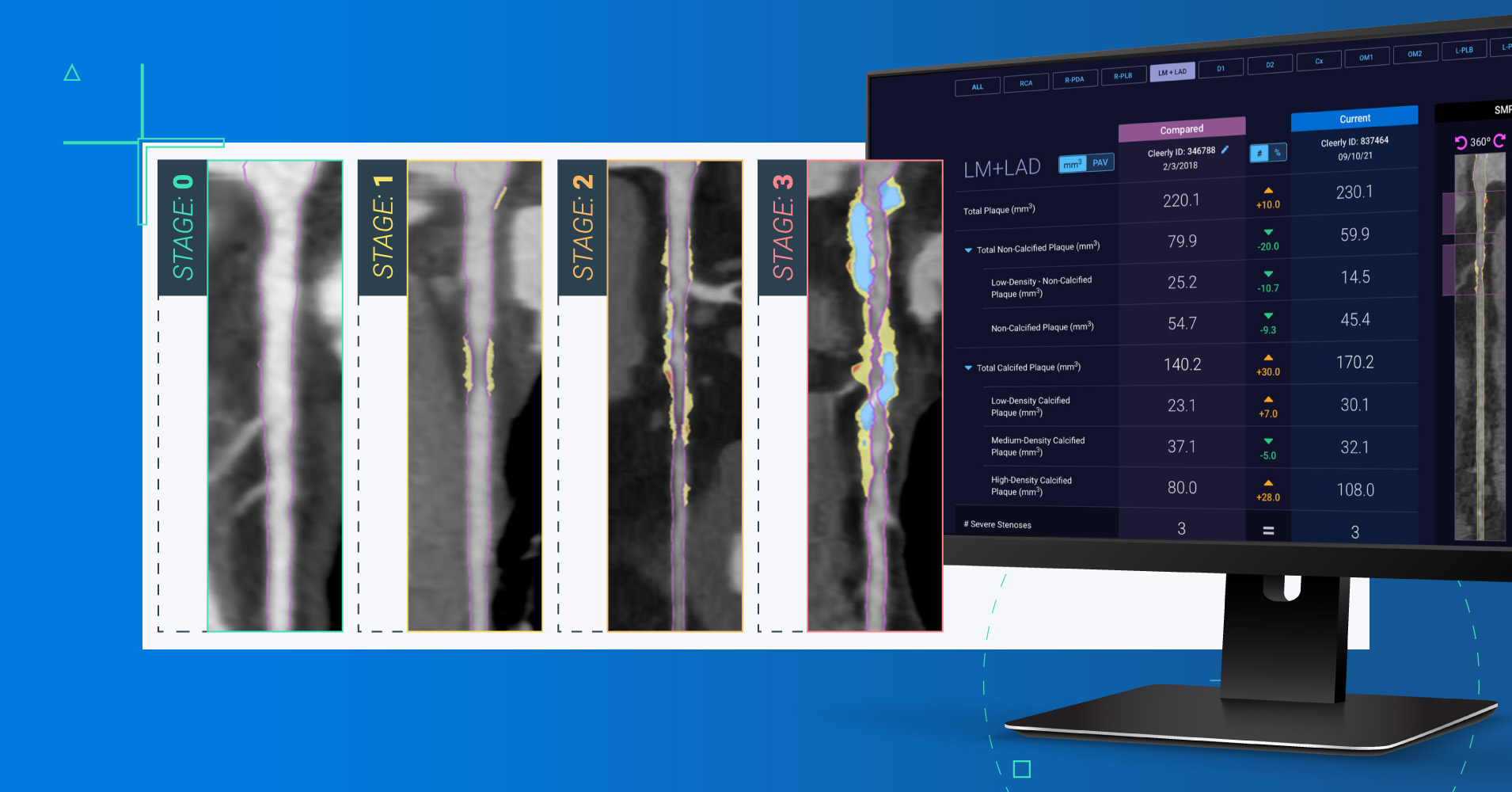The Recipe to a Healthy Heart:Your Guide to Preventing Heart Disease
Sure, the taste of food is important, but do you know how your diet impacts your heart? Many foods contain hidden ingredients that negatively impact...
3 min read
 Cleerly
:
March 14, 2023
Cleerly
:
March 14, 2023

Cleerly attended the American College of Cardiology conference (ACC.23/WCC) to showcase our efforts in providing a safe and effective approach to understanding cardiovascular disease risk and guiding personalized treatment. Our team presented compelling clinical data in nine poster and oral abstract sessions that were well received by attendees, including study data about a proposed four-stage system for evaluating individual patient disease burden and our new AI-powered ischemia prediction algorithm for CCTA.
We were pleased to be part of this year’s conversation on the latest science and innovation as well as practice-changing updates advancing cardiovascular care. The prevalence of cardiovascular disease (CAD) is on the rise. Cleerly is a company focused on preventing heart attacks, so we see ACC as an opportunity to showcase our efforts underway to provide a safe, accurate, and effective approach to understanding disease risk and guiding personalized treatment.
Our team presented compelling clinical data in nine poster and oral abstract sessions that were well received by attendees.
Quantification of CAD burden and atherosclerotic plaque type is the strongest determinant of future risk of major adverse cardiac events. The new proposed treatment algorithms,9 outlined by the Innovations in Prevention Working Group of the American College of Cardiology, provide personalized recommendations for medical interventions based on the combination of CCTA quantification of atherosclerotic plaque burden and traditional cardiovascular risk factors from existing clinical guidelines.
It was helpful for us to engage and learn from industry-leading clinicians and researchers who are advancing cardiovascular care. Based on our interactions and insights gleaned from conversations at the conference, we believe it is imperative we continue our efforts to educate providers and individuals on the value of quantitative plaque analysis for understanding heart disease risk. A better understanding of this risk can enhance clinical decision-making, help providers avoid unnecessary and high-cost procedures, as well as improve the patient and provider experience.
We invite readers to connect with Cleerly to learn more about the science powering our approach to whole-heart evaluation.
Want to learn more about Cleerly?
Connect With Us
References
1. Quantitative Plaque Staging System Predicts Long-Term Cardiovascular Outcomes in Patients At Risk for Atherosclerotic Cardiovascular Disease. Journal of the American College of Cardiology. March 2023.
2. High Diagnostic Accuracy of AI-Ischemia in Comparison to PET, FFR-CT, SPECT, and Invasive FFR: A Pacific Sub Study. Journal of the American College of Cardiology. March 2023
3. Comparison of Coronary Plaque Characteristics in Younger South Asian and Non-Hispanic White Populations Utilizing CCTA: A Matched Cohort Study. Journal of the American College of Cardiology. March 2023.
4. Race/Ethnic Differences in Coronary Atherosclerotic Plaque Assessed on Cardiac Computed Tomography Angiography (CCTA) In an Asymptomatic United States Population: Results from the Miami Heart Study. Journal of the American College of Cardiology. March 2023.
5. Distribution of Coronary Atherosclerosis in Patients with Diabetes Mellitus, Using Quantitative CT Plaque Analysis: Results from the Miami Heart Study. Journal of the American College of Cardiology. March 2023.
6. Firefighters Coronary Plaque Prevalence and Characteristics in Comparison to Non-Firefighters. Journal of the American College of Cardiology. March 2023.
7. Elevated LP(a) and Inflammatory Markers Are Associated with Increased Low-Density Plaque Volume, Which May Explain Increased ASCVD Risk. Journal of the American College of Cardiology. March 2023.
8. AI-QCT Demonstrates Superior Accuracy for the Diagnosis of Obstructive CAD by QCA Standard Compared to Core Lab CCTA Interpretation. Journal of the American College of Cardiology. March 2023.
9. Integrating Coronary Atherosclerosis Burden and Progression with Coronary Artery Disease Risk Factors to Guide Therapeutic Decision Making. The American Journal of Medicine. March 2023.

Sure, the taste of food is important, but do you know how your diet impacts your heart? Many foods contain hidden ingredients that negatively impact...

As we reach the end of 2023 and yet another remarkable year at Cleerly, it’s a great opportunity to reflect on all we’ve accomplished and begin...

Cleerly has had a busy few months – attending conferences, panel sessions, and winning awards as we all work together to achieve our mission of a...

Quantification of coronary artery disease (CAD) burden and atherosclerotic plaque type has been shown to be the strongest determinant of future risk...

According to the American Heart Association (AHA), nearly half of Americans have some type of cardiovascular disease.1 Despite such wide prevalence,...

"It's very scary because I had a lot of patients and even friends and neighbors that had heart attacks, and we thought they were healthy by eating...